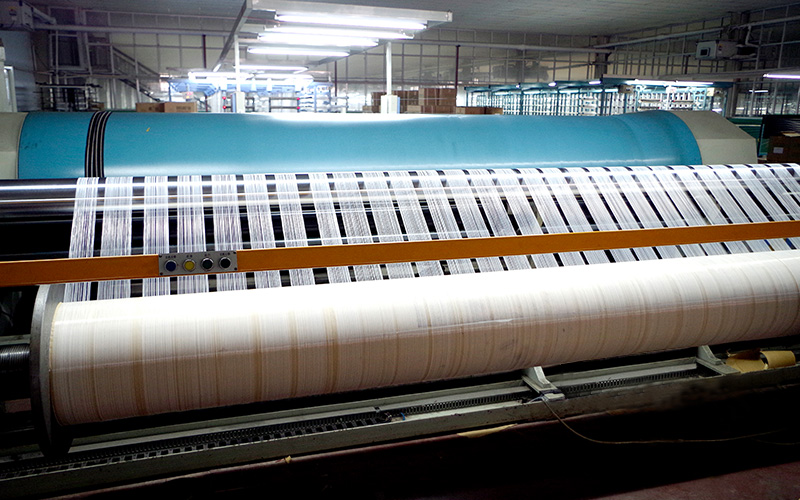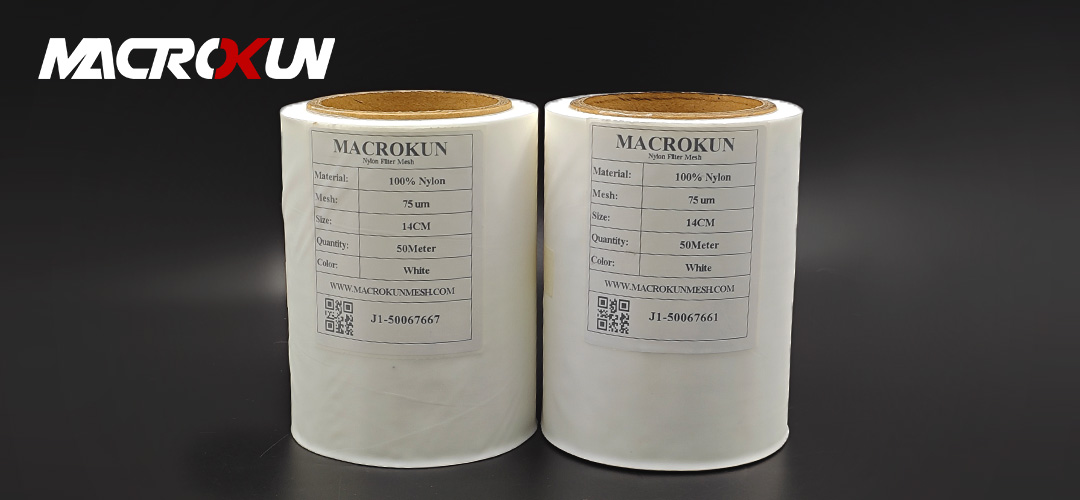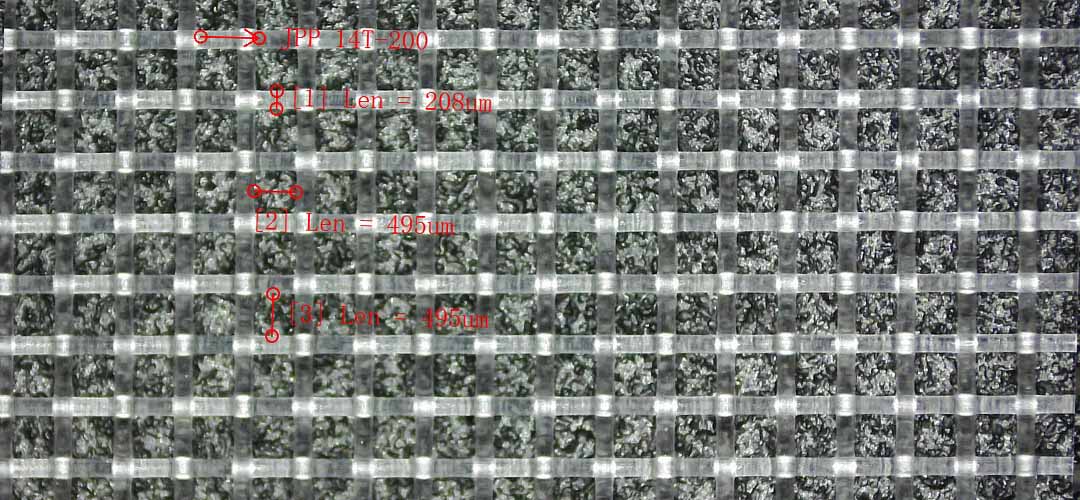Nylon mesh has become a popular choice for industrial screening due to its durability and versatility. This material is made from synthetic fibers that are woven together to create a strong and flexible mesh that can withstand the rigors of industrial use. Nylon mesh is commonly used in a variety of industries, including mining, agriculture, and manufacturing, where it is used for filtering, sifting, and separating materials.
One of the key advantages of nylon mesh is its durability. Unlike other materials, such as metal or plastic, nylon mesh is resistant to corrosion, rust, and degradation from exposure to harsh chemicals or extreme temperatures. This makes it an ideal choice for industrial applications where the screening material needs to withstand tough conditions without losing its effectiveness.
In addition to its durability, nylon mesh is also highly flexible and can be easily molded or shaped to fit a variety of screening applications. This flexibility allows for greater customization and precision in screening processes, ensuring that materials are properly filtered and separated according to specific requirements. Nylon mesh can also be easily cut to size, making it a cost-effective solution for businesses looking to reduce waste and optimize their screening processes.
Another advantage of nylon mesh is its ability to provide consistent and reliable screening results. The uniformity of the mesh weave ensures that materials are evenly distributed and separated, leading to more accurate screening outcomes. This consistency is crucial in industries where precision and quality control are paramount, such as in pharmaceutical manufacturing or food processing.

Furthermore, nylon mesh is easy to clean and maintain, making it a practical choice for businesses looking to streamline their screening processes. Unlike metal screens, which can be difficult to clean and prone to clogging, nylon mesh can be easily rinsed or wiped clean, ensuring that it remains free from debris and contaminants that could affect screening performance.

Nylon mesh is also lightweight and easy to handle, making it a convenient option for businesses that require frequent screening or material handling. Its flexibility and ease of use make it a versatile solution for a wide range of industrial applications, from separating aggregates in construction to filtering liquids in chemical processing.
Overall, nylon mesh offers a durable, flexible, and reliable solution for industrial screening needs. Its resistance to corrosion, flexibility, and ease of maintenance make it a practical choice for businesses looking to improve their screening processes and optimize their operations. With its ability to provide consistent and accurate screening results, nylon mesh is a valuable asset for industries that require precision and efficiency in their material handling and processing.
Nylon mesh is a versatile material that finds applications in various industries due to its durability and flexibility. One of the key uses of nylon mesh is in screening applications, where it is used to separate particles of different sizes or to filter out impurities. The strength and resilience of nylon mesh make it an ideal choice for industrial use, where it can withstand harsh conditions and heavy-duty operations.
In the mining industry, nylon mesh is commonly used for screening and separating ore particles of different sizes. The mesh is placed over a vibrating screen, which helps to separate the ore into different grades based on size. Nylon mesh is preferred in this application due to its high tensile strength and resistance to abrasion, which allows it to withstand the constant movement and friction involved in the screening process.
Another industry where nylon mesh is widely used is the food and beverage industry. In food processing plants, nylon mesh is used for filtering liquids and separating solids from liquids. The mesh is often used in filtration systems to remove impurities and contaminants from food products, ensuring that the final product meets quality and safety standards. Nylon mesh is preferred in this application due to its non-reactive nature and resistance to chemicals, making it safe for use in food processing.
The pharmaceutical industry also relies on nylon mesh for various applications, such as filtering and sieving powders and granules. Nylon mesh is used in pharmaceutical manufacturing to ensure that the final product is free of impurities and meets strict quality control standards. The mesh is often used in tablet coating processes to remove excess coating material and ensure uniformity in the final product. Nylon mesh is preferred in this application due to its high filtration efficiency and ability to withstand the high temperatures and pressures involved in pharmaceutical manufacturing.
In the automotive industry, nylon mesh is used for various applications, such as air filtration and engine components. Nylon mesh is commonly used in air filters to remove dust, dirt, and other particles from the air entering the engine, ensuring optimal performance and longevity of the engine. The mesh is also used in engine components, such as oil filters and fuel filters, to remove impurities and contaminants from the lubricating oil and fuel, ensuring smooth operation of the engine. Nylon mesh is preferred in this application due to its high filtration efficiency and resistance to chemicals and oils.
Overall, nylon mesh is a durable and versatile material that finds applications in various industries due to its strength, flexibility, and resistance to harsh conditions. Whether it is used for screening, filtering, or separating, nylon mesh offers a reliable solution for industrial use, ensuring optimal performance and efficiency in a wide range of applications.
Nylon mesh screens are a popular choice for industrial applications due to their durability and versatility. These screens are commonly used for filtering, sifting, and screening various materials in industries such as food processing, pharmaceuticals, mining, and agriculture. To ensure the longevity and effectiveness of nylon mesh screens, proper maintenance and cleaning are essential.
One of the key factors in maintaining nylon mesh screens is regular inspection. Inspecting the screens for any signs of wear and tear, such as holes, tears, or stretched areas, is crucial to prevent any potential damage or contamination during the screening process. It is recommended to inspect the screens before and after each use to identify any issues early on and address them promptly.
In addition to regular inspections, proper cleaning of nylon mesh screens is essential to ensure optimal performance. Cleaning the screens regularly helps to remove any buildup of debris, particles, or contaminants that may affect the screening process. There are several methods that can be used to clean nylon mesh screens, depending on the type of material being screened and the level of contamination.

One common method for cleaning nylon mesh screens is using a mild detergent or cleaning solution. This method involves soaking the screens in a solution of water and detergent, then gently scrubbing them with a soft brush or cloth to remove any buildup of dirt or debris. After cleaning, the screens should be rinsed thoroughly with clean water to remove any residue from the detergent.
Another effective method for cleaning nylon mesh screens is using a pressure washer. Pressure washing is a quick and efficient way to remove stubborn dirt, debris, or contaminants from the screens. However, it is important to use the appropriate pressure setting to avoid damaging the screens. It is recommended to start with a low pressure setting and gradually increase the pressure as needed.
Ultrasonic cleaning is another method that can be used to clean nylon mesh screens. This method involves using high-frequency sound waves to agitate a cleaning solution, which helps to remove dirt, debris, and contaminants from the screens. Ultrasonic cleaning is particularly effective for removing fine particles that may be difficult to remove with other cleaning methods.
After cleaning, it is important to properly dry the nylon mesh screens to prevent any mold or mildew growth. The screens should be air-dried in a clean, well-ventilated area away from direct sunlight. It is important to ensure that the screens are completely dry before storing them to prevent any moisture-related issues.
In conclusion, proper maintenance and cleaning of nylon mesh screens are essential to ensure their longevity and effectiveness in industrial applications. Regular inspections, proper cleaning methods, and thorough drying are key steps in maintaining nylon mesh screens. By following these guidelines, businesses can ensure that their nylon mesh screens continue to perform optimally and contribute to the efficiency of their operations.
When it comes to industrial screening applications, choosing the right material is crucial for ensuring efficiency and durability. Nylon mesh has emerged as a popular choice for screening due to its unique properties that make it well-suited for a wide range of industrial applications. In this article, we will compare nylon mesh to other screening materials to highlight the advantages of using nylon mesh in industrial settings.
One of the key advantages of nylon mesh is its durability. Nylon is a synthetic material that is known for its strength and resilience, making it ideal for use in high-impact industrial environments. Unlike other materials such as stainless steel or polyester, nylon mesh is less prone to corrosion and wear, ensuring a longer lifespan and reduced maintenance costs.
| Model | Mesh Count (/cm) |
Mesh Count (/inch) |
Thread Dia (um) |
Mesh Opening (um) |
Thickness (um) |
Weight (g/m2) |
| NL4/1950 | 4 | 10 | 550 | 1950 | 1100 | 307 |
| NL5/1500 | 5 | 13 | 500 | 1500 | 1000 | 318 |
| NL6/1267 | 6 | 15 | 400 | 1267 | 800 | 244 |
| NL7/1079 | 7 | 18 | 350 | 1079 | 700 | 218 |
| NL8/900 | 8 | 20 | 350 | 900 | 700 | 249 |
| NL9/861 | 9 | 23 | 250 | 861 | 500 | 143 |
| NL9/811 | 9 | 23 | 300 | 811 | 600 | 206 |
| NL10/750 | 10 | 25 | 250 | 750 | 500 | 159 |
| NL10/700 | 10 | 25 | 300 | 700 | 600 | 229 |
| NL12/583 | 12 | 30 | 250 | 583 | 500 | 191 |
| NL12/533 | 12 | 30 | 300 | 533 | 600 | 274 |
| NL14/514 | 14 | 36 | 200 | 514 | 340 | 142 |
| NL16/425 | 16 | 40 | 200 | 425 | 340 | 160 |
| NL20/350 | 20 | 50 | 150 | 350 | 255 | 113 |
| NL20/300 | 20 | 50 | 200 | 300 | 340 | 200 |
| NL24/267 | 24 | 60 | 150 | 267 | 255 | 135 |
| NL28/237 | 28 | 70 | 120 | 237 | 204 | 101 |
| NL30/213 | 30 | 76 | 120 | 213 | 204 | 110 |
| NL32/213 | 32 | 80 | 100 | 213 | 170 | 80 |
| NL36/178 | 36 | 90 | 100 | 178 | 170 | 90 |
| NL40/150 | 40 | 100 | 100 | 150 | 170 | 100 |
| NL43/153 | 43 | 110 | 80 | 153 | 136 | 70 |
| NL48/128 | 48 | 120 | 80 | 128 | 136 | 77 |
| NL56/119 | 56 | 140 | 60 | 119 | 102 | 50 |
| NL64/96 | 64 | 160 | 60 | 96 | 102 | 58 |
| NL72/89 | 72 | 180 | 50 | 89 | 85 | 45 |
| NL80/75 | 80 | 200 | 50 | 75 | 85 | 50 |
| NL100/57 | 100 | 250 | 43 | 57 | 73 | 46 |
| NL110/48 | 110 | 280 | 43 | 48 | 73 | 52 |
| NL120/48 | 120 | 300 | 35 | 48 | 60 | 37 |
| NL120/40 | 120 | 300 | 43 | 40 | 73 | 55 |
| NL130/42 | 130 | 330 | 35 | 42 | 60 | 40 |
| NL130/34 | 130 | 330 | 43 | 34 | 73 | 61 |
| NL140/36 | 140 | 350 | 35 | 36 | 60 | 43 |
| NL157/25 | 157 | 400 | 43 | 25 | 73 | 74 |
| NL180/20 | 180 | 450 | 39 | 20 | 66 | 68 |
| NL200/15 | 200 | 500 | 39 | 15 | 66 | 76 |
| NL220/10 | 220 | 550 | 39 | 10 | 66 | 84 |
| NL240/5 | 240 | 600 | 39 | 5 | 66 | 91 |
In addition to its durability, nylon mesh is also highly flexible and can be easily customized to meet specific screening requirements. This flexibility allows for the creation of screens with varying mesh sizes and configurations, making nylon mesh suitable for a wide range of applications, from filtering to sorting and separating materials.
Another advantage of nylon mesh is its resistance to chemicals and abrasion. Nylon is inherently resistant to many chemicals, making it an ideal choice for screening applications where exposure to corrosive substances is a concern. Additionally, nylon mesh is highly resistant to abrasion, ensuring that it maintains its integrity even in high-wear environments.
Compared to other screening materials such as stainless steel or polyester, nylon mesh is also lightweight and easy to handle. This makes installation and maintenance of nylon mesh screens a breeze, reducing downtime and labor costs associated with screen replacement.
Furthermore, nylon mesh is cost-effective compared to other screening materials. While stainless steel screens may have a higher upfront cost, nylon mesh offers a more affordable alternative without compromising on quality or performance. This makes nylon mesh a cost-effective solution for industrial screening applications where budget constraints are a concern.
In conclusion, nylon mesh is a durable, flexible, and cost-effective screening material that is well-suited for a wide range of industrial applications. Its unique properties make it an ideal choice for industries that require reliable and efficient screening solutions. By comparing nylon mesh to other screening materials, it is clear that nylon mesh stands out as a superior option for industrial use. Whether you are looking to filter, sort, or separate materials, nylon mesh is a versatile and reliable choice that will meet your screening needs with ease.
Pre: Nylon Mesh for Filter Sieves: A High-Quality Choice for Particle Separation
Next: Nylon Mesh for Filter Screens: A Cost-Effective Solution for Industrial Use

MACROKUN has established long-term and stable cooperative relations with many transportation companies such as China Post, DHL, FEDEX, USPS, UPS, etc. Of course, MACROKUN can also provide air and sea transportation. The powerful logistics system enables all MACROKUN'S Printing Mesh, Filter Mesh and Filter Bags and so on to be easily and efficiently transported to any place. For quotes and inquiries, please email our sales team.





